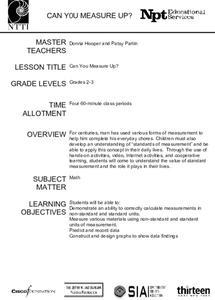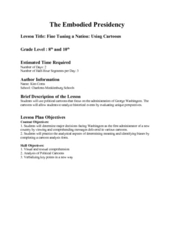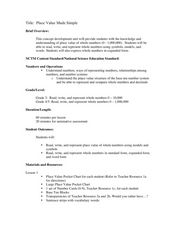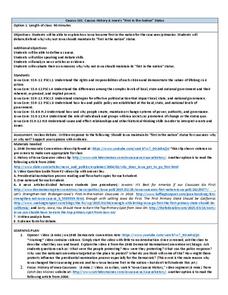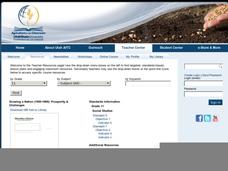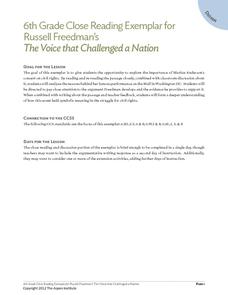Curated OER
Exploring our National Parks
Middle schoolers utilize maps/Atlases to find key spatial information, locate U.S. National Parks, characterize the geography of a specific region, and create a National Park brochure.
Curated OER
Chapter 39: The Economics of Developing Countries
The disparity between the standards of living in industrialized countries versus developing countries has gotten wider - and this presentation can help your class learn why. With a multitude of key definitions and facts, these slides go...
Curated OER
Photography and the National Park Service
During the 1800s the United States was expanding westward; land was there for the taking. Kids explore how some early photographers used their photography to influenced the US Congress to save areas like Mirror Lake. They...
WolfQuest
The Return of Gray Wolves to Yellowstone National Park: Right or Wrong?
Should gray wolves be removed from Yellowstone National Park? After researching the complex relationships between the various habitats and species at Yellowstone National Park, including humans, class members take a position...
Curated OER
Can You Measure Up?
Here is a well-designed lesson on common standards of measurement for your young mathematicians. In it, learners calculate measurements in standard and non-standard units. They make predictions, record data, and construct and design...
Columbus City Schools
Poetry Speaking and Listening Standards
Celebrate April's National Poetry Month or enrich a poetry unit with a wealth of language arts material. Class members develop an oral interpretation of a poem and/or develop a podcast interview with a poet.
Curated OER
Place Value of Whole Numbers Through One Million
Third graders construct numbers to the millions place. In this 30-page place value lesson, learners create numbers and evaluate the place value of digits. They explore standard and expanded form of numbers. An incredible resource!
Curated OER
Model United Nations Activity
Students examine current and past problems and situations affecting the United Nations, and explore life, career, and philosophy of Ralph Bunche, American diplomat and Nobel Peace Prize winner. Students then prepare portfolios to...
Curated OER
Immigration Connections: The Squamish Nation and Bainbridge Island Filipino Americans
High schoolers explore ancestry and immigration. In this Canadian immigration instructional activity, students interview their family members to identify their cultural history. They compose an essay that compares Filipino immigration...
Discovery Education
By the Foot: The History of Measurement
When is a foot not a foot? When you use the length of your own foot to measure distances, of course. To underscore the importance of standardized units of measurement, middle schoolers engage in a series of activities that ask them to...
Curated OER
To Join or not to Join the League of Nations - That is the Question
Students evaluate the possible reasons the United States did not become part of the League of Nations. In this World History lesson plan, students discuss the pros and cons of what might have happened if the United States had joined the...
Curated OER
Fine Tuning a Nation: Using Cartoons
Learners examine political cartoons to gain an understanding of the political issues that George Washington faced. In this historical perspectives lesson plan, students analyze political cartoons about the National Bank, the title...
Curated OER
Children Around The World
Students read a multicultural book called "This Is the Way We Go to School" by Edith Baer and Steve Bjorhman. They become culturally aware of the different nationalities around the world and different ways that they may do things on a...
Curated OER
Place Value Made Simple
Elementary schoolers explore place value to the millions place. They construct and evaluate the value of numbers. Working in small groups, pupils problem solve with pocket place value charts, and examine standard and expanded forms. This...
Curated OER
Place Value of Decimals to Hundredths: Diving for Decimals
Constructing decimals correctly is a crucial concept for elementary students to grasp. Here, have the young mathematicians in your class explore standard and expanded form while comparing decimal values. This unit is taught while...
Curated OER
Analytical Problem Solving
High schoolers explore about propagation of error in calculations using experimental data. They develop their weighing and pipetting techniques. Students explore the following terms: Standard deviation and relative standard deviatin....
Pulitzer Center
Peacebuilding: Taking Home Lessons Learned in Africa
Learners take a closer look at one journalist's work on UN Peacebuilding efforts in four African nations: Sierra Leone, Burundi, Central African Republic, and Guinea Bissau. They collaborate to define peacebuilding and discuss...
Curated OER
My Family and Our Nationality
After completing the activities included here, your beginning foreign language speakers will be able to name family members, identify a family's place of origin, and write short sentences about family members. They start by listening to...
Dream of a Nation
Writing a Narrative Essay
Imagine using narrative essays to encourage change. This multi-week unit plan does just that. After reading a series of articles from Tyson Miller's Dream of a Nation: Inspiring Ideas for a Better America, class members examine the...
Theodore Roosevelt Association
Defining America's Role in the World
As the first American president to win the Nobel Peace Prize, and only one of four presidents to do so in United States history, Theodore Roosevelt's foreign policy achievements and preservation of peace are often overshadowed by his...
Agriculture in the Classroom
Growing a Nation (1930-1949): From Defeat to Victory, Lesson 2
Using primary source materials including radio broadcasts, films, and interview transcripts, history students gain a better understanding of the Dust Bowl, relief efforts for farmers, and the nation's agricultural past. It includes...
Caucus 101
Caucus History and Iowa’s “First in the Nation” Status
What is a caucus? Why is Iowa's first? Why did Iowa shift to the caucus format? After researching these basic questions, class members debate the question of whether or not Iowa should maintain its "first in the nation" status for caucuses.
Agriculture in the Classroom
Growing a Nation (1950-1969): Prosperity & Challenges: The Story of American Agriculture
A wonderful lesson on the development and impact of mechanized farming! History or agriculture classes learn the historical background of the United States' food production by creating a pamphlet with information on the cause and...
Aspen Institute
The Voice That Challenged a Nation
Included here are step-by-step instructions for conducting a close reading of The Voice That Challenged a Nation by Russell Freedman. After an individual and class reading, class members read carefully through the text excerpt,...




